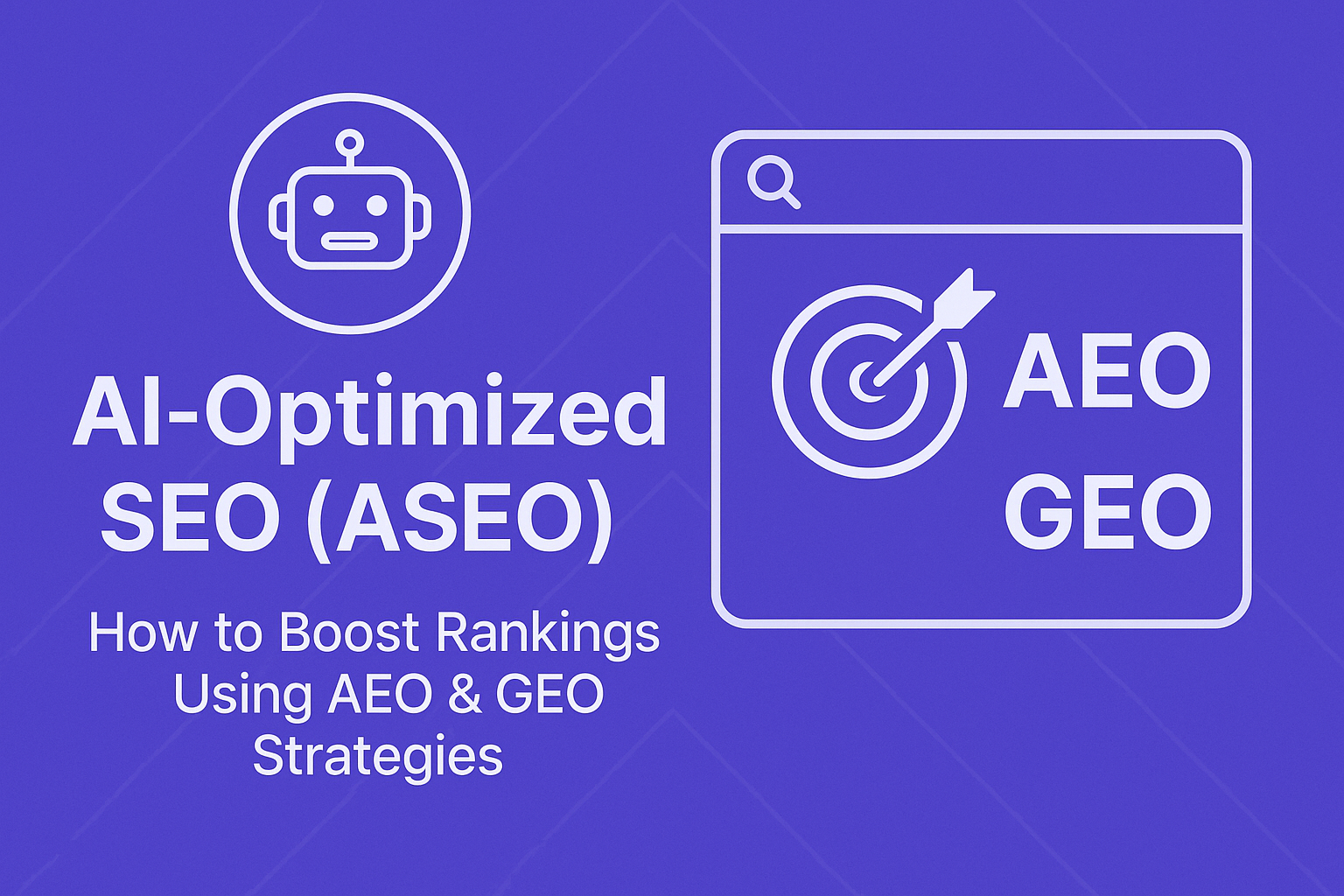Introduction
Search has entered a new era — driven by artificial intelligence, voice assistants, and generative AI tools like ChatGPT, Google SGE, and Perplexity AI. Traditional SEO strategies alone are no longer enough to keep your content visible. That’s where AI-optimized SEO (ASEO) comes in. By combining the power of AEO (Answer Engine Optimization) and GEO (Generative Engine Optimization), ASEO helps your content rank not only on Google but also inside AI-generated responses and voice search results. In this guide, we’ll explore what ASEO is, why it matters in 2025, and how to apply it to stay ahead in the evolving search landscape.
What is AI-Optimized SEO (ASEO)?
AI-optimized SEO, or ASEO, is the process of creating and optimizing content that performs well in both traditional search engines and AI-driven platforms. These platforms include tools such as ChatGPT, Google SGE (Search Generative Experience), Perplexity AI, and Bing Copilot, which generate direct answers from web content instead of just displaying links.
ASEO focuses on:
- Matching search intent
- Structuring content for AI readability
- Using semantic keywords
- Optimizing for conversational and voice-based queries
- Leveraging AI tools to plan, write, and optimize content
Unlike old-school SEO, which primarily focuses on rankings, ASEO prioritizes visibility in both AI-generated answers and search engine results pages (SERPs).
Why AI-Optimized SEO (ASEO) Matters in 2025
The way people search online has changed dramatically.
Today’s users:
- Ask full, natural questions (“What’s the best way to learn SEO in 2025?”)
- Use voice search on mobile and smart devices
- Trust AI-generated answers more than scrolling through multiple links
Meanwhile, tools like Google SGE are pushing summaries instead of links. ChatGPT, Gemini, and Perplexity are becoming starting points for product research, content discovery, and technical troubleshooting.
If your content isn’t structured to be found — and used — by these systems, it’s likely to be ignored.
What is AEO, and How Does it help ASEO?
AEO (Answer Engine Optimization) is all about structuring content to provide clear, direct answers to common questions. It focuses on how to rank in:
- Google’s Featured Snippets
- Voice search responses
- AI-generated Q&A tools like ChatGPT
AEO ensures your content:
- Answers one question per section
- Uses structured formats like FAQs, lists, or how-to steps
- Includes FAQ schema to help Google understand your content
- Offers concise, conversational answers
By integrating AEO into ASEO, you’re making it easier for both search engines and AI engines to select your content as the most relevant answer.
What is GEO and Why It’s the Future of SEO
GEO (Generative Engine Optimization) is the next evolution of SEO. It prepares your content to appear in AI tools like ChatGPT, Perplexity, and Gemini.
AI search engines don’t “crawl and rank” in the same way Google does. Instead, they look for:
- Conversational, natural language content
- Short, helpful summaries
- Well-structured headings and logical flow
- Content with citations and trustworthy sources
GEO means writing for AI, not just humans. Your content should sound like it belongs in a conversation, because AI models summarize, quote, and respond based on tone and structure.
How AEO + GEO Work Together in ASEO
Think of ASEO as a three-part strategy:
| Strategy | Purpose | Platform |
| AEO | Answer specific questions | Google, Bing, Voice search |
| GEO | Make content readable to AI | ChatGPT, Perplexity, Gemini |
| SEO | Optimize for search engines | Google SERPs, Bing |
All three work together to make your content findable, understandable, and useful — no matter where users are searching.
ASEO Step-by-Step Strategy
Let’s break down how to apply ASEO to your next blog post or landing page.
Step 1: Research with AI & SEO Tools
Use ChatGPT, Perplexity, or Google’s “People Also Ask” to find natural language questions people are asking. Then, validate them with tools like Ahrefs, Semrush, or Ubersuggest.
Example: “How does ASEO help with voice search?” or “Can ChatGPT find my blog?”
Step 2: Create a Clear, Question-Based Outline
Use H2s and H3s as questions. This mimics voice search and improves your chances of appearing in rich results.
Instead of: “ASEO Overview”
Use: “What is ASEO and Why is it Important?”
Step 3: Write in a Conversational, Human Tone
AI engines prioritize content that sounds like it was written for humans, not bots. Short sentences, contractions (“you’re,” “it’s”), and everyday language help. Think: “Here’s how it works” instead of “The process is as follows.”
Step 4: Use Semantic Keywords
Don’t stuff your main keyword. Instead, use related terms naturally:
- AI search optimization
- Voice SEO techniques
- Optimize content for ChatGPT
- Semantic SEO best practices
Use SurferSEO, Frase.io, or MarketMuse to get keyword suggestions.
Step 5: Add Structured Data (Schema)
Apply FAQ, Article, or HowTo schema using a plugin like RankMath or manually via JSON-LD.
This helps Google, Bing, and AI tools understand the structure of your content.
Step 6: Answer Questions Quickly
Make your answer the first sentence of every section. Aim for under 40 words — the sweet spot for voice search and featured snippets.
Q: What is ASEO?
A: ASEO stands for AI-Optimized SEO. It uses AI tools and strategies to help your content rank in both search engines and AI-generated answers.
Step 7: Optimize Title & Meta Description
For Yoast SEO or RankMath, write a meta title under 60 characters and a description under 160. Include your main keyword near the beginning.
Example Title:
AI-Optimized SEO (ASEO): Rank in Google, ChatGPT & More
Meta Description:
Learn how ASEO uses AEO and GEO to optimize your content for AI tools like ChatGPT, Google SGE, and voice search in 2025.
Best Tools for AI-Optimized SEO
Here are the top tools to help you execute ASEO effectively:
| Tool | Use |
| ChatGPT | Schema integration, meta tags, and FAQs |
| Perplexity AI | Research current questions being asked |
| SurferSEO | On-page SEO optimization & content score |
| Frase.io | AI-powered content briefs, SERP analysis |
| RankMath Pro | Schema integration, meta tags, FAQs |
| Google Search Console | Idea generation, outline creation, and voice-style answers |
ASEO Optimization Tips
- Use FAQ sections with short, clear answers
- Keep your sentences under 20 words
- Use bullet points and tables where possible
- Include alt text on images (important for AI parsing)
Write as if you’re explaining to a beginner
Final Thoughts: Why You Need ASEO Now
The internet is no longer just indexed — it’s interpreted by AI. Whether a user is typing a query on Google or speaking to a smart speaker, your content needs to be structured for both humans and machines.
That’s why AI-optimized SEO (ASEO) is not just a trend — it’s a requirement. By combining AEO for precise answers and GEO for AI readability, you’re giving your content the best chance to rank across every major platform, not just the SERP.
Start applying ASEO today to stay ahead of the competition and win traffic from both search engines and AI-powered tools.
AI‑Optimized SEO is the process of optimizing content to rank in both traditional search results and AI-generated answers (like Google SGE, ChatGPT, or Perplexity AI) using AEO and GEO strategies.
Because AI-powered search is changing how people find information, optimizing for AI and answer engines ensures your content appears in voice search and AI tools, not just Google.
AEO focuses on answering questions clearly for search engines, while GEO optimizes content structure for generative AI tools to cite and summarize effectively.
Use natural-language keywords, write clear answers, structure content with headings, add FAQ/HowTo schema, and write in a conversational tone.
Tools like ChatGPT, Perplexity, AlsoAsked, AnswerThePublic, and SEO plugins like Rank Math or Yoast SEO are useful for ASEO planning.



